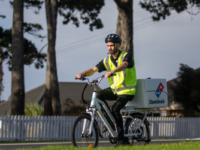One of the great benefits of having a client base of over 200 franchise systems is that we get a great industry wide perspective of the state of the franchise nation.
Contrary to most media commentary, our experience is that our clients have typically seen the Covid-19 pandemic as a moment of progress rather than crisis.
Most are planning to expand their businesses in the next 12 months, with key areas of focus being diversification, online sales, vertical integration and even merger and acquisition.
There is no doubt that the Government’s support framework, notably the JobKeeper payments and the rental relief initiatives, has been critical. Indeed without that support most businesses would have experienced dire economic consequences.
The potential for further disruption from Covid remains, but to date aggregate consumer demand has remained remarkably resilient.
Franchisees have also been remarkably resilient, taking cover or curling up into small balls to weather the worst of the storm, then re-emerging quickly to capture the available opportunities.
Here are our top seven positive behaviours we have observed that demonstrate the best of resilience in franchising…
Top 7 signs of franchise resilience
1. Strong franchisor leadership
In tough times franchisees, customers, suppliers and landlords value strong leadership.
Leadership is manifested in qualities such as heightened franchisor visibility, demonstrated empathy, calmness, continued focus on the customer and more frequent communications.
In tough times trust becomes critical, as action needs to be taken quickly and all need to follow the leader.
We saw an email from one franchisee to its franchisor that gave quite emotional and heartfelt thanks to their franchisor’s team for the level of support and quality of information provided during such challenging times.
2. Rapid adjustment to fulfil new customer requirements for goods or services
One of our clients quickly pivoted from selling baked goods to selling flour and baking ingredients at some of their franchised stores, thereby not only keeping the stores trading but clearing ingredients that would otherwise have perished. This was also an excellent example of franchisor and franchisee collaboration for mutual benefit.
3. Acceleration of online capability
Although consumer spending online has been increasing every year for the past 20 years, the lockdowns caused by the pandemic meant online became almost the only channel to market for most businesses.
For established franchise networks, the online channel can sometimes be viewed with suspicion by franchisees. Covid demonstrated that consumer preferences cannot be ignored, and online and retail channels can successfully complement each other.
If a brand does not have an effective online channel, it will end up in palliative care, and customers will drift from franchisees to the competitors that offer a more integrated model.
4. Diversification and taking advantage of collateral opportunities
In particular, a focus on supply chain efficiencies, vertical integration and strategic acquisitions. There are great expansion opportunities presented by the current economic conditions that many clients are taking.
Covid showed up flaws in many supply chains, and smart clients have taken the opportunity to strike more attractive arrangements or acquire smaller strategic suppliers.
The capacity of franchisors and franchisees to rebound quickly sees them better placed to take advantage of new opportunities.
5. Switching to multiple delivery options
Rapid movement to multiple delivery options that enable customers to receive what they want where they want it.
Again Covid demonstrated that the traditional bricks and mortar offering needs to interface with the online channel, not just be standalone.
Interestingly customers were happy to modify their behaviour, and embraced touch free pick up arrangements and click and collect.
We saw an uptick in franchisee engagement with online, and greater preparedness to embrace multi-channel distribution of goods and services.
From a customer perspective the well run franchise systems outperformed the pure online models, many of which were totally reliant on delivery when franchise systems could also offer click and collect and other options including local delivery by franchisees.
6. Embracing payment flexibility
Cash is no longer king, customers require multiple payment mechanisms including paperless options and all technology solutions.
New payment mechanisms such as Afterpay are very popular with customers, and we expect to see demand for acceptance of new cryptocurrencies such as Bitcoin. Covid meant franchisors had to move quickly to accommodate changed customer expectations, and likewise franchisees realised they needed to provide multiple payment options and be technologically literate.
Franchisors and franchisees realised change was essential for survival, so just got on with it.
7. Excellence in data use and security
Data is critical, and precious. The best franchise systems collect and use data effectively in their businesses, supplementing their own data with sophisticated additional data relating to their customers. They also take great care to ensure the security of data.
Cybersecurity threats are profound, and potentially existential.
Customers also demand the highest standards in data protection. We saw franchise clients experience issues with cyberattacks, but observed that franchise systems have data spread throughout their network, so have an ability to recover more quickly.
Is franchising the right model?
Perhaps more controversially, a significant number of clients has undertaken a review of their franchise model in its entirety. Is franchising the right model for future expansion, or is agency or partnership or joint venture or company owned more appropriate?
Such reflection has also been partially motivated by the constant negative media coverage of franchising, the increasingly prescriptive and complex regulatory environment, the challenges of securing high quality franchisees and concerns in relation to class actions, litigation funding and organised disputation.
Interestingly these observations have been validated by two recent surveys – Forrester Consulting’s research paper Resilience In Retail: Reshaping The Payments Experience in December 2020, and current Australian Stock Exchange data comparing the performance of the indices of smaller capitalised companies to market leaders, where the smaller companies have substantially outperformed the market leaders.
Performance of franchised businesses must by necessity be more anecdotal, which is why this article has been written.
The demonstrated resilience of the franchise sector should be something of great pride, and validates the fundamental efficiency and effectiveness of best practice franchise models where each party undertakes separate responsibilities, but also works collaboratively to deliver a compelling customer proposition.











